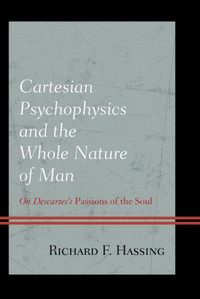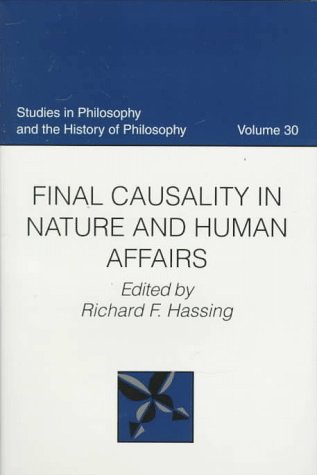-

Cartesian Psychophysics and the Whole Nature of Man: On Descartes’s Passions of the Soul
by Richard F. Hassing
Lanham, MD: Lexington Books, 2015Learn More -

Other Publications
“Two Reflexivities: Scholastic and Cartesian Second Intentions in Klein’s Greek Mathematical Thought and the Origin of Algebra,” in To Turn the Soul: Essays Inspired by Jacob Klein, Daniel P. Maher and Andrew Romiti, eds. (Philadelphia: Paul Dry Books, 2025), 257-279.
“What sort of reality is spacetime? Cosgrove on Einstein, Minkowski and Klein,” New Yearbook for Phenomenology and Phenomenological Philosophy XX (2023): 397-416.
“Aristotelian Intelligible Form and Cartesian Imageable Quantity: Physics 2.1 vs. Rule 14,” The Aquinas Review 25, no. 1 (2022): 29-58.
“The Question of Self-Reference in Nicomachean Ethics, Book 6,” Interpretation 49, no. 1 (2022): 3-24.
“Modern Turns in Mathematics and Physics,” in The Modern Turn, Michael Rohlf, ed. (Washington, DC: Catholic University of America Press, 2017): 131-182.
Cartesian Psychophysics and the Whole Nature of Man: On Descartes’s Passions of the Soul (Lanham, MD: Lexington Books, 2015).
“Laws versus Teleology,” International Encyclopedia of Philosophy and the Social Sciences, Vol. II (Sage Publications, 2013), 549-555.
“History of Physics and the Thought of Jacob Klein,” New Yearbook for Phenomenology and Phenomenological Philosophy XI (2012): 219-253.
“Descartes on God, Creation and Conservation,” Review of Metaphysics 64 (March 2011): 603-620.
“Thumos and Psychophysics in Descartes’s Passions of the Soul,” Interpretation 38, no. 1 (Fall 2010): 27-72.
“Difficulties for Natural Law Based on Modern Conceptions of Nature,” in Contemporary Perspectives on Natural Law, Ana Marta Gonzalez, ed. (Hampshire, UK: Ashgate Publishing, 2008), 229-240.
“The Meaning and Force of Liberalism,” in Presente y futuro del liberalismo (Present and future of liberalism), Enrique Banus and Alejandro Llano, eds. (Pamplona: Ediciones Universidad de Navarra, 2004), 345-355.
“Leibniz without Physics,” Review of Metaphysics 56, no. 4 (June 2003): 721-61.
“Darwinian Natural Right?,” an essay review of Larry Arnhart’s Darwinian Natural Right, Interpretation 27, no. 2 (2000): 129-160, and “Reply to Arnhart,” Interpretation 28, no. 1 (2000): 35-43.
“The Exemplary Career of Newton’s Mathematics,” The St. John’s Review 44, no. 1 (1997): 72-93.
“Introduction” to Final Causality in Nature and Human Affairs, Richard F. Hassing, ed. (Washington, DC: Catholic University of America Press, 1997), 1-51.
“Modern Natural Science and the Intelligibility of Human Experience,” in Final Causality in Nature and Human Affairs, Richard F. Hassing, ed. (Washington, DC: Catholic University of America Press, 1997), 211-256.
The Federalist Post-1989, Ashbrook Essay No. 8 (Ashland, OH: Ashbrook Press, 1995); an English version of R. F. Hassing and A. M. Hassing, Problemele Republicanismului Democratic (Cluj, Romania: Biblioteca Apostrof, 1994).
“Animals versus the Laws of Inertia,” Review of Metaphysics 46 (1992): 29-61.
With E. M. Macierowski, "Latin Averroes on the pisibility and Self-Motion of the Elements," Archiv fur Geschichte der Philosophie 74, no. 2 (1992): 127-157.
“Thomas Aquinas on Phys. VII.1 and the Aristotelian Science of the Physical Continuum,” in Nature and Scientific Method, Daniel O. Dahlstrom, ed. (Washington, DC: Catholic University Press, 1991), 150-88.
With E. M. Macierowski, “John Philoponus on Aristotle’s Definition of Nature,” Ancient Philosophy 8 (1988): 73-100.
“Wholes, Parts, and Laws of Motion,” Nature and System 6 (1984): 195-215.
“The Use and Non-Use of Physics in Spinoza’s Ethics,” The Southwestern Journal of Philosophy 11 (1980): 41-70.
With J. W. Wilkins, “Critical Fluctuations in Superconductors: A Functional Integral Approach,” Physical Review B7 (1973): 1890-1907.
